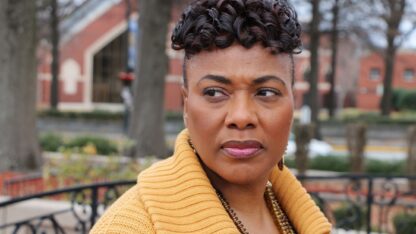Republicans seek to spotlight politics of schools in Georgia

Emil Moffatt / WABE
Social conservatives are looking to push education policy to the forefront when Georgia lawmakers begin meeting Monday, driven by a national tumult over the pandemic and race.
“I think education is going to be the No. 1 issue at the capitol this year,” said Cole Muzio, president of the Frontline Policy Council, a Christian conservative lobbying group.
Republicans are taking cues from Glenn Youngkin’s gubernatorial victory in Virginia, believing school policy can sway swing voters who voted for Democrats in recent Georgia elections.
The top two issues are likely to be efforts to ban or block obscene materials from school websites and libraries and to regulate what schools can teach about race. But conservatives also want to give parents a greater ability to examine school curricula, restrict sex education, ban transgender girls from playing high school sports and guarantee religious freedom for students.
Democrats see the push as mostly motivated by politics.
“These are not the central issues that we need to focus on,” said House Minority Leader James Beverly, a Macon Democrat.
Republicans are rallying against critical race theory, a term stretched from its original meaning as examining how societal structures perpetuate racial disparities to a broader indictment of diversity initiatives and teaching about race.
Muzio said his group is pushing back against the idea that “all history is a history of race and division.” He said some teachers can create a climate of “inherent hostility in the classroom.”
It’s unclear what the proposals will do. Senate Education Committee Chairman Chuck Payne, a Dalton Republican, said Wednesday he had yet to see any bills. The state Board of Education in June adopted a resolution saying schools should not “indoctrinate” students and should not teach that anyone is inherently racist or should be treated differently because of their race.
Democrats say Georgia should not sanitize or shy away from history.
“I believe that I’m a stronger person because I understand and was taught not the simple pieces, but the complexity of who we are,” Democratic gubernatorial candidate Stacey Abrams said in December. “Because you can’t get better, we can’t be a stronger country if we lie to ourselves about where we were, and how we get to the better place.”
One possible point of contention is whether parents will be able to go to court or otherwise force action if they see violations. School groups want complaints to go to the state Professional Standards Commission, which handles current teacher licensure complaints.
Republicans are also pushing new limits on inappropriate content in schools, another theme that echoes fights in other states. Last year, Senate Bill 226 came close to passing. It originally proposed to make school librarians subject to criminal prosecution for obscenity, but was rewritten to let people who object to material to appeal to a school’s principal, who would have seven days to decide whether to keep a book or other material.
Proponents of the bill actually said one main concern is student access to proprietary databases. House Speaker Pro Tem Jan Jones, a Milton Republican, said she seeks to prevent online access to inappropriate materials, saying she wants the state Department of Education to ensure all schools use adequate filtering programs. She said online learning during the pandemic has exposed weak controls.
“The concern is the ease with which students can be exposed to age inappropriate materials from school-issued devices or school-authorized search engines,” Jones said.
School librarians and free speech advocates have opposed limits, but Jones said some concerns are inaccurate. “I do not seek to burn any books,” she said.
The race and obscenity debates boil down to a parent’s ability to control their child’s education. That could lead to efforts to create a parent’s bill of rights, something that could win support from Gov. Brian Kemp.
“It’s a parent’s right to be heard,” Muzio said.
State Superintendent Richard Woods told The Associated Press he will ask the state Board of Education next week to adopt transparency measures. They include public listings of all outside curricula used by a school district and all district-level tests given to students. Districts would also be required to post budgets and surveys of students, teachers and staff.
Some lawmakers could seek to require school districts to hold in-person class, bar them from requiring students and employees to wear masks and bar them from requiring vaccines. Legislators could also debate anew whether the state should subsidize more students attending private schools. Lawmakers could raise the amount of tax money they funnel to private scholarship groups via a tax credit above the current $100 million ceiling.








